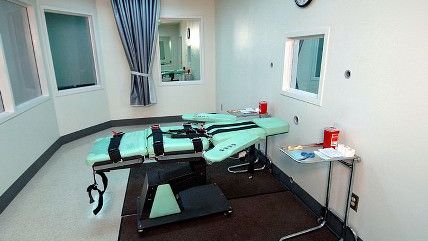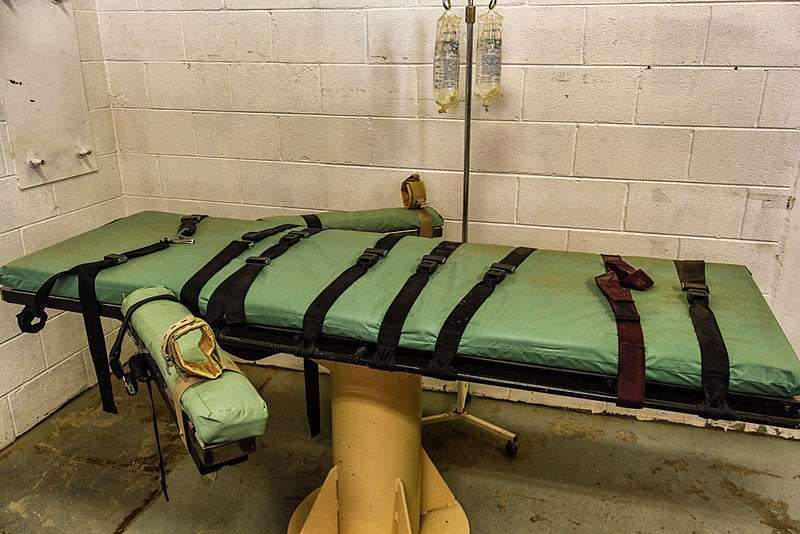Oklahoma's Horrific Botched Execution Could Have Been Prevented


Last night, a horrific scene played out at the Oklahoma State Penitentiary as prison officials attempted to carry out the first of what was supposed to have been a double execution.
At 6:23 p.m., the execution began for Clayton Lockett, convicted in 1999 of killing 19-year-old Stephanie Neiman.
Five minutes after a cocktail of lethal drugs was injected, Lockett began shivering, breathing deep, blinking, and gritting his teeth. Seven minutes into the execution, Lockett alerted prison officials that he was still conscious. Ten minutes into the execution, prison officials announced that he was finally unconscious. Thirteen minutes in, Lockett moved his head from side to side and then lifted it off of the bed. Fifteen minutes in, Lockett was mumbling, breathing heavily, and appeared to be struggling. Sixteen minutes in, Lockett said "man" out loud, and tried to get up. Following this, a female prison official told horrified eyewitnesses, "We are going to lower the blinds temporarily." The blinds were never lifted.
Minutes after the blinds went down, the director of prisons told eyewitnesses there had been a "vein failure" and that he was using his authority to issue a stay of execution. Less than a half hour later, after the director of prisons admitted the execution had been botched, Lockett was pronounced dead from what officials said was a heart attack.
Shortly after Lockett's grisly death, Oklahoma Gov. Mary Fallin (R) issued an executive order granting a 14-day stay for stay of execution for Charles Warner, the inmate who was scheduled to be executed two hours after Lockett. Warner's execution is now scheduled for May 13.
In her press release, Governor Fallin said that she had asked the Oklahoma Department of Corrections "to conduct a full review of Oklahoma's execution procedures to determine what happened and why" during Lockett's botched execution.
Executions in other states have been botched before, but what makes what happened in Oklahoma last night so particularly grotesque is that it could have, and should have, been prevented.
Over the past several months, questions had been raised over the constitutionality of the state's lethal injection secrecy law, which allowed state officials to prevent the disclosure of any information about the drugs used in lethal injections. Lawyers for condemned inmates argued that without being able to know even the most basic information about these drugs, it would be impossible to verify whether or not the executions carried out would comport with the Eighth Amendment of the Constitution, which prohibits cruel and unusual punishment.
On April 21, the Oklahoma Supreme Court stayed the executions of Lockett and Warner, which were scheduled to take place on April 22 and April 29, so that the justices could evaluate the legality of Oklahoma's secrecy law.
In an unprecedented move, Gov. Mary Fallin proclaimed on April 22 that Oklahoma's executive branch would not honor the state Supreme Court's stays of execution, and issued an executive order that granted a seven-day stay of execution for Clayton Lockett.
Even more shocking, a Republican state representative, Mike Christian, introduced impeachment proceedings on April 23 against the five state Oklahoma Supreme Court justices who had voted for the stays of execution, stating that the justices had used "unsupportable arguments regarding constitutional rights."
On April 24, the Oklahoma Supreme Court caved to political pressure, and declared that the state's injection secrecy law was constitutional, allowing the botched execution to proceed on April 29 as Governor Fallin ordered.
Besides the questions over the constitutionality of the state's secrecy law, concerns had also been raised over the state's essentially experimental three-drug execution cocktail, which included the drugs midazolam, vecuronium bromide, and potassium chloride.
This drug combination has only been used once before—in Florida. However, Florida's protocol called for five times more midazolam than Oklahoma's, which led some to predict the execution might not be effective. Because these drugs were obtained through secret means and information about them was protected under the state's secrecy law, there was no oversight from experts on the quality of the drugs.
Medical experts warned Oklahoma officials of the possibility of a botched execution, and defense attorneys asked them to open up the lethal injection process to review by the courts, doctors, and the public because of the dangers of this untested drug combination. It really should come as no surprise that this execution played out as it did.
If the state wasn't obsessed with killing these inmates so quickly and recklessly, and instead allowed the process to be transparent and open for review, Clayton Lockett's botched execution could have been prevented.
Instead, the state elevated an unsympathetic killer to a symbol of what the death penalty has become in states that are adopting secretive and experimental execution methods: a reckless abandonment of the rule of law.
UPDATE (2:07 p.m. ET): At roughly 1:00 p.m. ET, White House Press Secretary Jay Carney stated that Lockett's botched execution fell short of the humane standards required when capital punishment is carried out. Carney also relayed that Obama believes evidence shows the death penalty doesn't effectively deter crime, but the crimes in Lockett's case were indisputably heinous and merited the death penalty. As CBS reporter Andrew Cohen notes on his twitter feed, the Justice Department has remained mostly silent as challenges to injection secrecy have failed in federal courts across the country in recent months.
UPDATE (3:21 p.m. ET): In a statement given before the press, Oklahoma Governor Mary Fallin said there will be an independent review of the state's execution protocols following last night's botched execution. Fallin said the review will be led by Oklahoma Department of Safety Commissioner Michael Thompson.
According to journalists present, Fallin walked off the stage after her statement and did not take questions from the press.
Questions still remain over how this review will address the lack of transparency over the execution drugs as well as whether or not Warner's execution will be delayed beyond the current 14-day stay.


Show Comments (268)